Assessing Fiscal and Monetary Policy's Impact on Pharma Activities
VerifiedAdded on 2023/01/17
|9
|2636
|38
Report
AI Summary
This report examines the impact of fiscal and monetary policies on the pharmaceutical industry, focusing on the activities of organizations such as Actavis in the US and Canada Drugs Direct. It explores how these policies, including changes in tax rates and interest rates, influence the industry's operations and pricing strategies. The report analyzes the effects of these policies in both the US and Canada, considering factors like drug reimportation, WTO agreements, and the role of central banks. Furthermore, it delves into the influence of corporate social responsibility (CSR), ethics, and global and regional factors on the pharmaceutical sector, emphasizing environmental management, sustainable use of resources, and operational controls. The analysis also considers the impact of political, technological, environmental, and social factors on the industry's activities and the importance of ethical considerations and stakeholder perspectives. The report highlights the importance of adapting to various cultural perspectives and market access requirements.
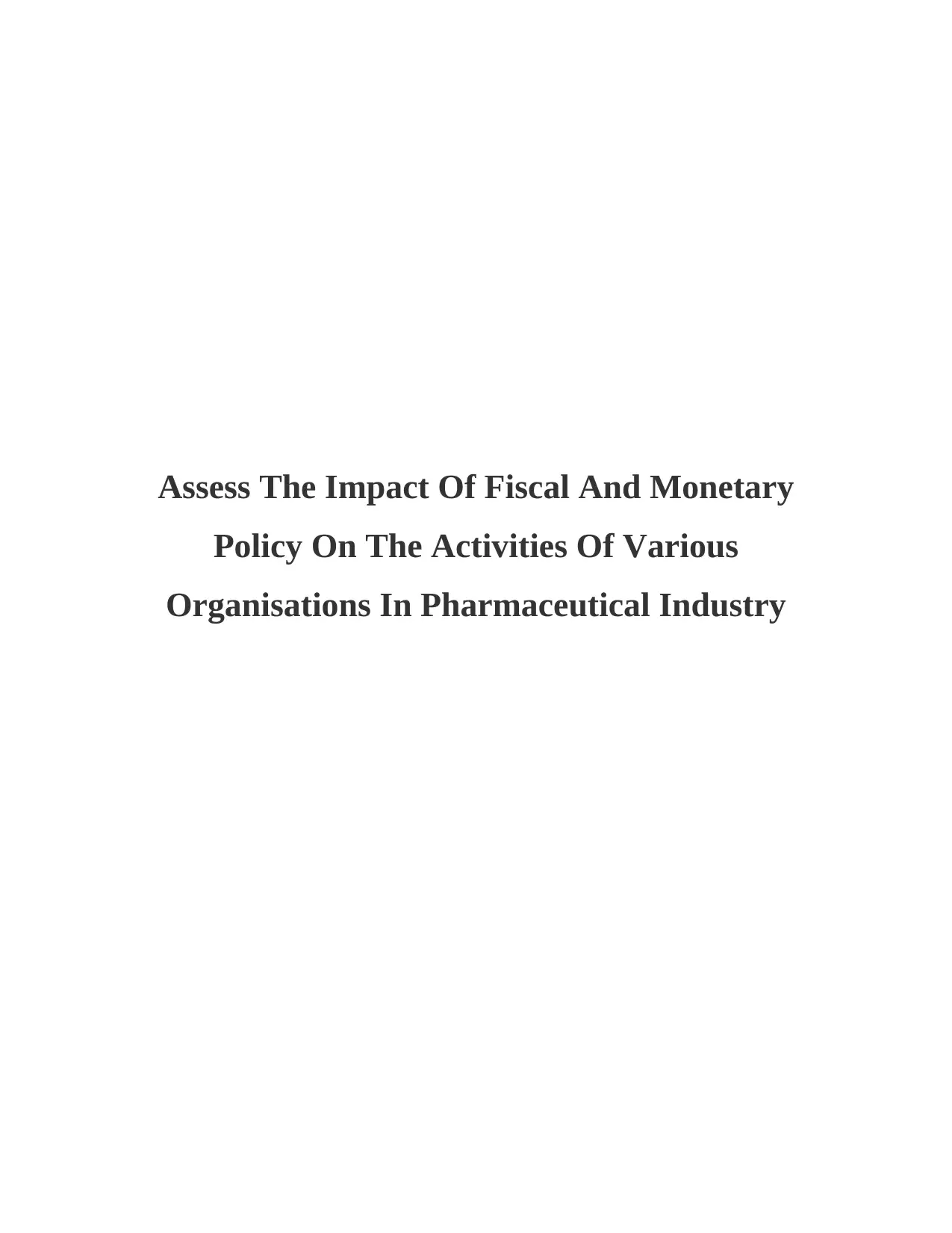
Assess The Impact Of Fiscal And Monetary
Policy On The Activities Of Various
Organisations In Pharmaceutical Industry
Policy On The Activities Of Various
Organisations In Pharmaceutical Industry
Paraphrase This Document
Need a fresh take? Get an instant paraphrase of this document with our AI Paraphraser
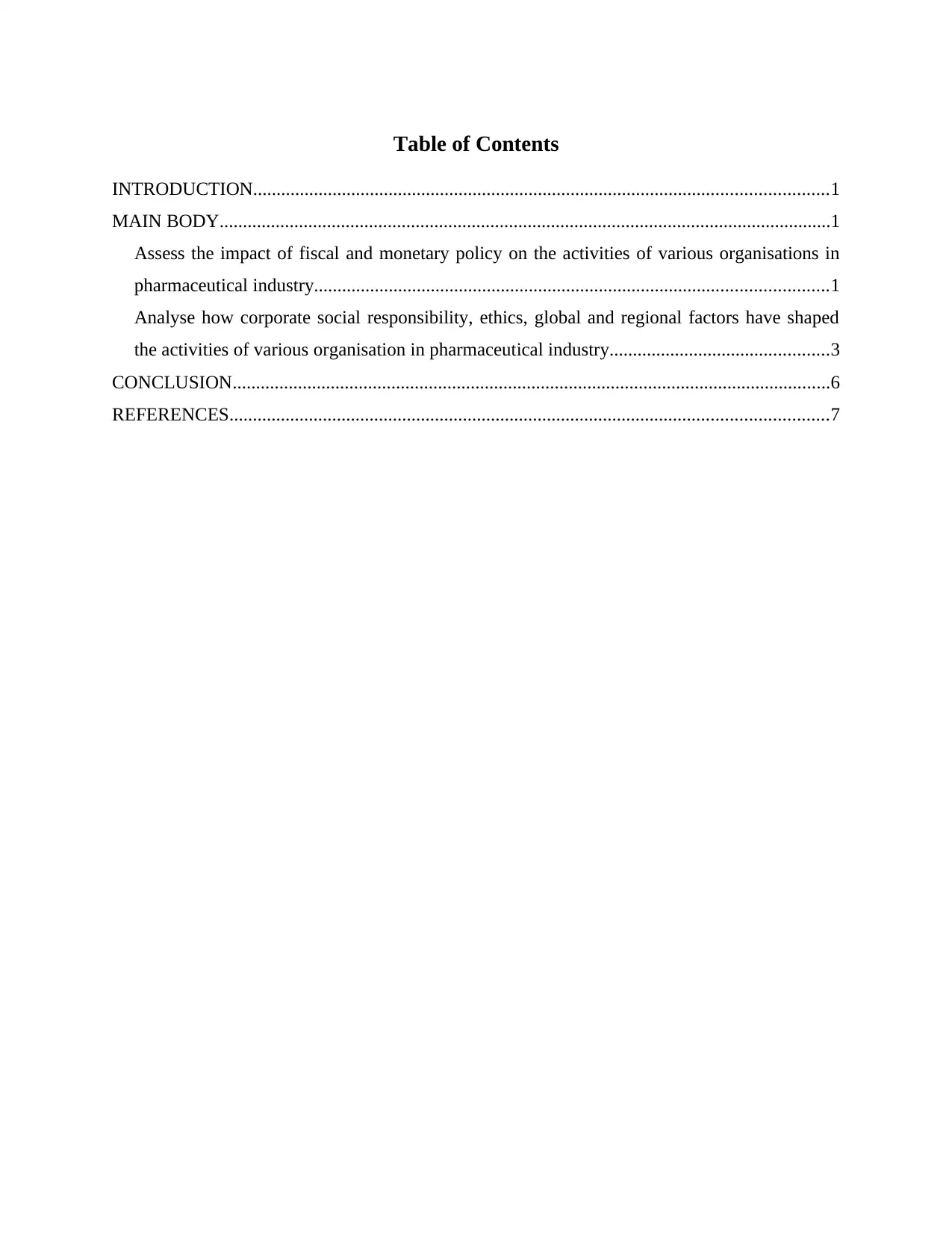
Table of Contents
INTRODUCTION...........................................................................................................................1
MAIN BODY...................................................................................................................................1
Assess the impact of fiscal and monetary policy on the activities of various organisations in
pharmaceutical industry..............................................................................................................1
Analyse how corporate social responsibility, ethics, global and regional factors have shaped
the activities of various organisation in pharmaceutical industry...............................................3
CONCLUSION................................................................................................................................6
REFERENCES................................................................................................................................7
INTRODUCTION...........................................................................................................................1
MAIN BODY...................................................................................................................................1
Assess the impact of fiscal and monetary policy on the activities of various organisations in
pharmaceutical industry..............................................................................................................1
Analyse how corporate social responsibility, ethics, global and regional factors have shaped
the activities of various organisation in pharmaceutical industry...............................................3
CONCLUSION................................................................................................................................6
REFERENCES................................................................................................................................7
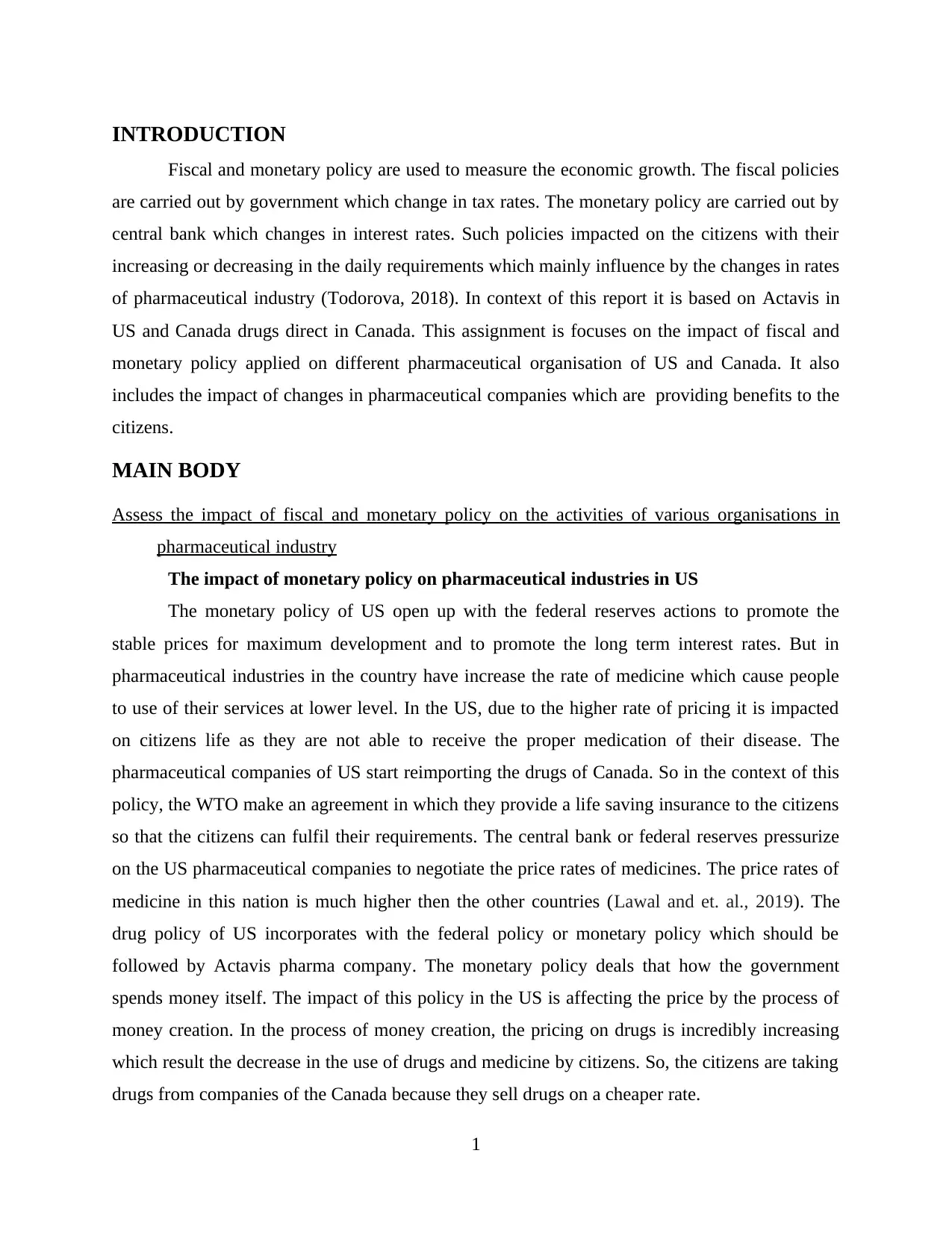
INTRODUCTION
Fiscal and monetary policy are used to measure the economic growth. The fiscal policies
are carried out by government which change in tax rates. The monetary policy are carried out by
central bank which changes in interest rates. Such policies impacted on the citizens with their
increasing or decreasing in the daily requirements which mainly influence by the changes in rates
of pharmaceutical industry (Todorova, 2018). In context of this report it is based on Actavis in
US and Canada drugs direct in Canada. This assignment is focuses on the impact of fiscal and
monetary policy applied on different pharmaceutical organisation of US and Canada. It also
includes the impact of changes in pharmaceutical companies which are providing benefits to the
citizens.
MAIN BODY
Assess the impact of fiscal and monetary policy on the activities of various organisations in
pharmaceutical industry
The impact of monetary policy on pharmaceutical industries in US
The monetary policy of US open up with the federal reserves actions to promote the
stable prices for maximum development and to promote the long term interest rates. But in
pharmaceutical industries in the country have increase the rate of medicine which cause people
to use of their services at lower level. In the US, due to the higher rate of pricing it is impacted
on citizens life as they are not able to receive the proper medication of their disease. The
pharmaceutical companies of US start reimporting the drugs of Canada. So in the context of this
policy, the WTO make an agreement in which they provide a life saving insurance to the citizens
so that the citizens can fulfil their requirements. The central bank or federal reserves pressurize
on the US pharmaceutical companies to negotiate the price rates of medicines. The price rates of
medicine in this nation is much higher then the other countries (Lawal and et. al., 2019). The
drug policy of US incorporates with the federal policy or monetary policy which should be
followed by Actavis pharma company. The monetary policy deals that how the government
spends money itself. The impact of this policy in the US is affecting the price by the process of
money creation. In the process of money creation, the pricing on drugs is incredibly increasing
which result the decrease in the use of drugs and medicine by citizens. So, the citizens are taking
drugs from companies of the Canada because they sell drugs on a cheaper rate.
1
Fiscal and monetary policy are used to measure the economic growth. The fiscal policies
are carried out by government which change in tax rates. The monetary policy are carried out by
central bank which changes in interest rates. Such policies impacted on the citizens with their
increasing or decreasing in the daily requirements which mainly influence by the changes in rates
of pharmaceutical industry (Todorova, 2018). In context of this report it is based on Actavis in
US and Canada drugs direct in Canada. This assignment is focuses on the impact of fiscal and
monetary policy applied on different pharmaceutical organisation of US and Canada. It also
includes the impact of changes in pharmaceutical companies which are providing benefits to the
citizens.
MAIN BODY
Assess the impact of fiscal and monetary policy on the activities of various organisations in
pharmaceutical industry
The impact of monetary policy on pharmaceutical industries in US
The monetary policy of US open up with the federal reserves actions to promote the
stable prices for maximum development and to promote the long term interest rates. But in
pharmaceutical industries in the country have increase the rate of medicine which cause people
to use of their services at lower level. In the US, due to the higher rate of pricing it is impacted
on citizens life as they are not able to receive the proper medication of their disease. The
pharmaceutical companies of US start reimporting the drugs of Canada. So in the context of this
policy, the WTO make an agreement in which they provide a life saving insurance to the citizens
so that the citizens can fulfil their requirements. The central bank or federal reserves pressurize
on the US pharmaceutical companies to negotiate the price rates of medicines. The price rates of
medicine in this nation is much higher then the other countries (Lawal and et. al., 2019). The
drug policy of US incorporates with the federal policy or monetary policy which should be
followed by Actavis pharma company. The monetary policy deals that how the government
spends money itself. The impact of this policy in the US is affecting the price by the process of
money creation. In the process of money creation, the pricing on drugs is incredibly increasing
which result the decrease in the use of drugs and medicine by citizens. So, the citizens are taking
drugs from companies of the Canada because they sell drugs on a cheaper rate.
1
⊘ This is a preview!⊘
Do you want full access?
Subscribe today to unlock all pages.

Trusted by 1+ million students worldwide
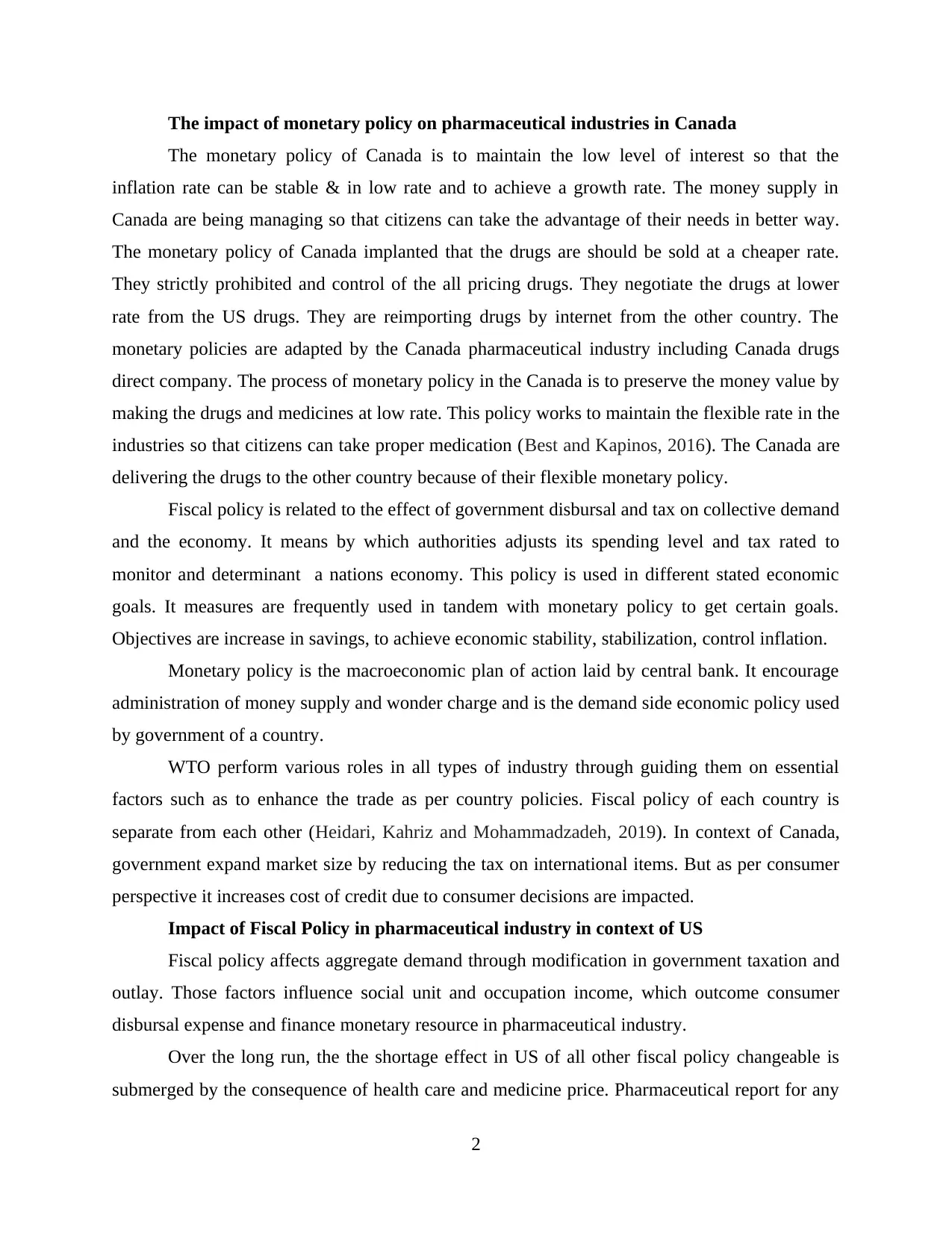
The impact of monetary policy on pharmaceutical industries in Canada
The monetary policy of Canada is to maintain the low level of interest so that the
inflation rate can be stable & in low rate and to achieve a growth rate. The money supply in
Canada are being managing so that citizens can take the advantage of their needs in better way.
The monetary policy of Canada implanted that the drugs are should be sold at a cheaper rate.
They strictly prohibited and control of the all pricing drugs. They negotiate the drugs at lower
rate from the US drugs. They are reimporting drugs by internet from the other country. The
monetary policies are adapted by the Canada pharmaceutical industry including Canada drugs
direct company. The process of monetary policy in the Canada is to preserve the money value by
making the drugs and medicines at low rate. This policy works to maintain the flexible rate in the
industries so that citizens can take proper medication (Best and Kapinos, 2016). The Canada are
delivering the drugs to the other country because of their flexible monetary policy.
Fiscal policy is related to the effect of government disbursal and tax on collective demand
and the economy. It means by which authorities adjusts its spending level and tax rated to
monitor and determinant a nations economy. This policy is used in different stated economic
goals. It measures are frequently used in tandem with monetary policy to get certain goals.
Objectives are increase in savings, to achieve economic stability, stabilization, control inflation.
Monetary policy is the macroeconomic plan of action laid by central bank. It encourage
administration of money supply and wonder charge and is the demand side economic policy used
by government of a country.
WTO perform various roles in all types of industry through guiding them on essential
factors such as to enhance the trade as per country policies. Fiscal policy of each country is
separate from each other (Heidari, Kahriz and Mohammadzadeh, 2019). In context of Canada,
government expand market size by reducing the tax on international items. But as per consumer
perspective it increases cost of credit due to consumer decisions are impacted.
Impact of Fiscal Policy in pharmaceutical industry in context of US
Fiscal policy affects aggregate demand through modification in government taxation and
outlay. Those factors influence social unit and occupation income, which outcome consumer
disbursal expense and finance monetary resource in pharmaceutical industry.
Over the long run, the the shortage effect in US of all other fiscal policy changeable is
submerged by the consequence of health care and medicine price. Pharmaceutical report for any
2
The monetary policy of Canada is to maintain the low level of interest so that the
inflation rate can be stable & in low rate and to achieve a growth rate. The money supply in
Canada are being managing so that citizens can take the advantage of their needs in better way.
The monetary policy of Canada implanted that the drugs are should be sold at a cheaper rate.
They strictly prohibited and control of the all pricing drugs. They negotiate the drugs at lower
rate from the US drugs. They are reimporting drugs by internet from the other country. The
monetary policies are adapted by the Canada pharmaceutical industry including Canada drugs
direct company. The process of monetary policy in the Canada is to preserve the money value by
making the drugs and medicines at low rate. This policy works to maintain the flexible rate in the
industries so that citizens can take proper medication (Best and Kapinos, 2016). The Canada are
delivering the drugs to the other country because of their flexible monetary policy.
Fiscal policy is related to the effect of government disbursal and tax on collective demand
and the economy. It means by which authorities adjusts its spending level and tax rated to
monitor and determinant a nations economy. This policy is used in different stated economic
goals. It measures are frequently used in tandem with monetary policy to get certain goals.
Objectives are increase in savings, to achieve economic stability, stabilization, control inflation.
Monetary policy is the macroeconomic plan of action laid by central bank. It encourage
administration of money supply and wonder charge and is the demand side economic policy used
by government of a country.
WTO perform various roles in all types of industry through guiding them on essential
factors such as to enhance the trade as per country policies. Fiscal policy of each country is
separate from each other (Heidari, Kahriz and Mohammadzadeh, 2019). In context of Canada,
government expand market size by reducing the tax on international items. But as per consumer
perspective it increases cost of credit due to consumer decisions are impacted.
Impact of Fiscal Policy in pharmaceutical industry in context of US
Fiscal policy affects aggregate demand through modification in government taxation and
outlay. Those factors influence social unit and occupation income, which outcome consumer
disbursal expense and finance monetary resource in pharmaceutical industry.
Over the long run, the the shortage effect in US of all other fiscal policy changeable is
submerged by the consequence of health care and medicine price. Pharmaceutical report for any
2
Paraphrase This Document
Need a fresh take? Get an instant paraphrase of this document with our AI Paraphraser
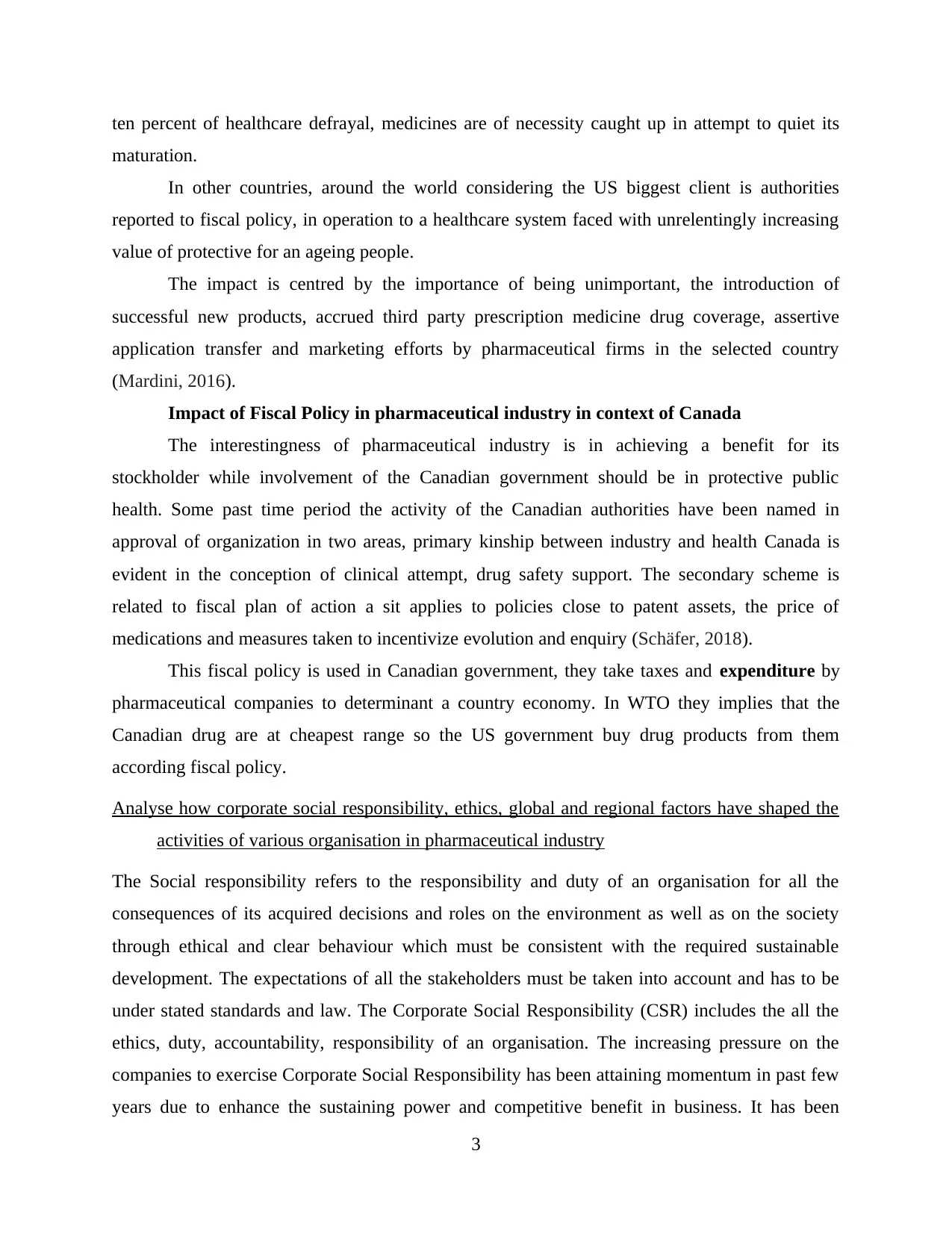
ten percent of healthcare defrayal, medicines are of necessity caught up in attempt to quiet its
maturation.
In other countries, around the world considering the US biggest client is authorities
reported to fiscal policy, in operation to a healthcare system faced with unrelentingly increasing
value of protective for an ageing people.
The impact is centred by the importance of being unimportant, the introduction of
successful new products, accrued third party prescription medicine drug coverage, assertive
application transfer and marketing efforts by pharmaceutical firms in the selected country
(Mardini, 2016).
Impact of Fiscal Policy in pharmaceutical industry in context of Canada
The interestingness of pharmaceutical industry is in achieving a benefit for its
stockholder while involvement of the Canadian government should be in protective public
health. Some past time period the activity of the Canadian authorities have been named in
approval of organization in two areas, primary kinship between industry and health Canada is
evident in the conception of clinical attempt, drug safety support. The secondary scheme is
related to fiscal plan of action a sit applies to policies close to patent assets, the price of
medications and measures taken to incentivize evolution and enquiry (Schäfer, 2018).
This fiscal policy is used in Canadian government, they take taxes and expenditure by
pharmaceutical companies to determinant a country economy. In WTO they implies that the
Canadian drug are at cheapest range so the US government buy drug products from them
according fiscal policy.
Analyse how corporate social responsibility, ethics, global and regional factors have shaped the
activities of various organisation in pharmaceutical industry
The Social responsibility refers to the responsibility and duty of an organisation for all the
consequences of its acquired decisions and roles on the environment as well as on the society
through ethical and clear behaviour which must be consistent with the required sustainable
development. The expectations of all the stakeholders must be taken into account and has to be
under stated standards and law. The Corporate Social Responsibility (CSR) includes the all the
ethics, duty, accountability, responsibility of an organisation. The increasing pressure on the
companies to exercise Corporate Social Responsibility has been attaining momentum in past few
years due to enhance the sustaining power and competitive benefit in business. It has been
3
maturation.
In other countries, around the world considering the US biggest client is authorities
reported to fiscal policy, in operation to a healthcare system faced with unrelentingly increasing
value of protective for an ageing people.
The impact is centred by the importance of being unimportant, the introduction of
successful new products, accrued third party prescription medicine drug coverage, assertive
application transfer and marketing efforts by pharmaceutical firms in the selected country
(Mardini, 2016).
Impact of Fiscal Policy in pharmaceutical industry in context of Canada
The interestingness of pharmaceutical industry is in achieving a benefit for its
stockholder while involvement of the Canadian government should be in protective public
health. Some past time period the activity of the Canadian authorities have been named in
approval of organization in two areas, primary kinship between industry and health Canada is
evident in the conception of clinical attempt, drug safety support. The secondary scheme is
related to fiscal plan of action a sit applies to policies close to patent assets, the price of
medications and measures taken to incentivize evolution and enquiry (Schäfer, 2018).
This fiscal policy is used in Canadian government, they take taxes and expenditure by
pharmaceutical companies to determinant a country economy. In WTO they implies that the
Canadian drug are at cheapest range so the US government buy drug products from them
according fiscal policy.
Analyse how corporate social responsibility, ethics, global and regional factors have shaped the
activities of various organisation in pharmaceutical industry
The Social responsibility refers to the responsibility and duty of an organisation for all the
consequences of its acquired decisions and roles on the environment as well as on the society
through ethical and clear behaviour which must be consistent with the required sustainable
development. The expectations of all the stakeholders must be taken into account and has to be
under stated standards and law. The Corporate Social Responsibility (CSR) includes the all the
ethics, duty, accountability, responsibility of an organisation. The increasing pressure on the
companies to exercise Corporate Social Responsibility has been attaining momentum in past few
years due to enhance the sustaining power and competitive benefit in business. It has been
3
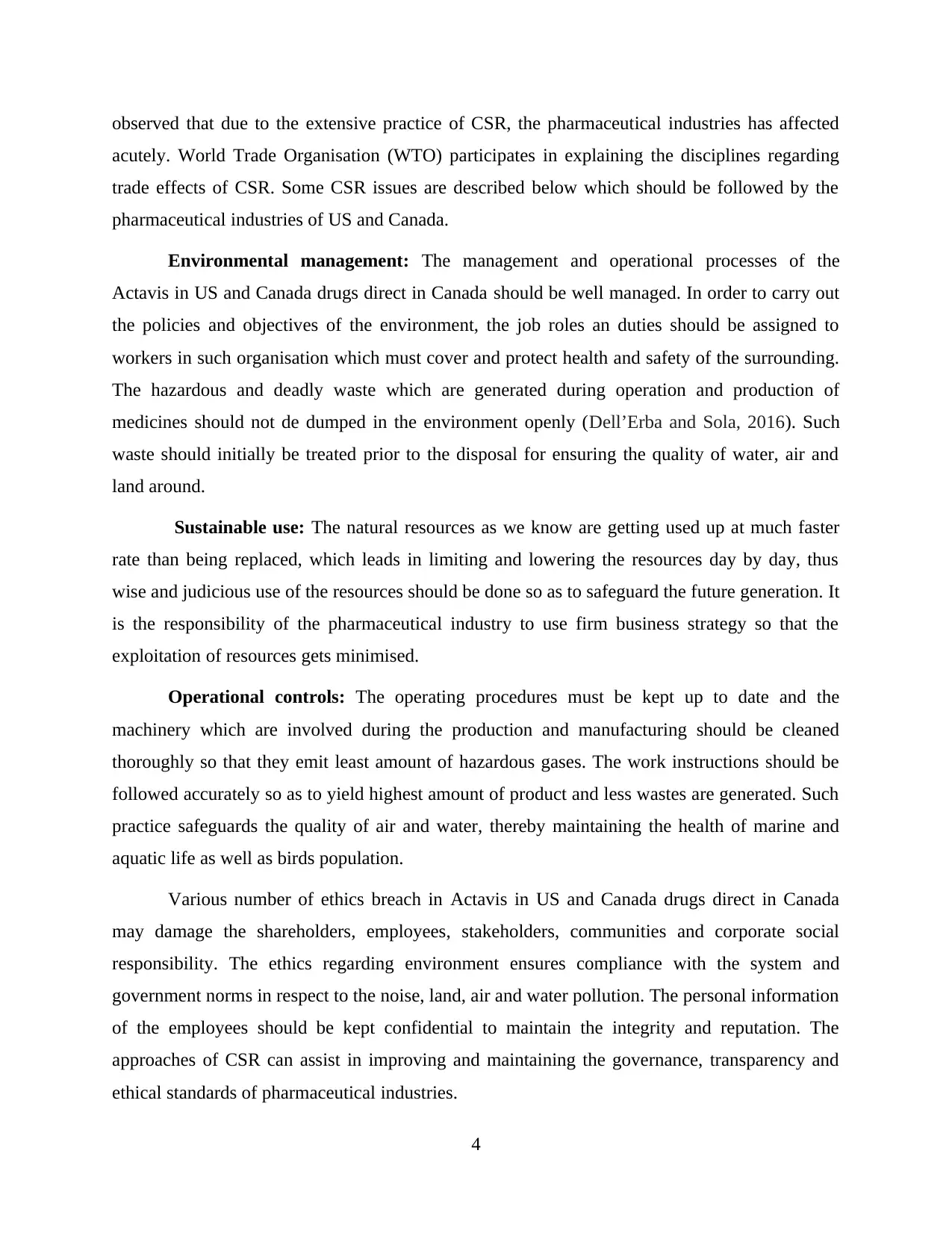
observed that due to the extensive practice of CSR, the pharmaceutical industries has affected
acutely. World Trade Organisation (WTO) participates in explaining the disciplines regarding
trade effects of CSR. Some CSR issues are described below which should be followed by the
pharmaceutical industries of US and Canada.
Environmental management: The management and operational processes of the
Actavis in US and Canada drugs direct in Canada should be well managed. In order to carry out
the policies and objectives of the environment, the job roles an duties should be assigned to
workers in such organisation which must cover and protect health and safety of the surrounding.
The hazardous and deadly waste which are generated during operation and production of
medicines should not de dumped in the environment openly (Dell’Erba and Sola, 2016). Such
waste should initially be treated prior to the disposal for ensuring the quality of water, air and
land around.
Sustainable use: The natural resources as we know are getting used up at much faster
rate than being replaced, which leads in limiting and lowering the resources day by day, thus
wise and judicious use of the resources should be done so as to safeguard the future generation. It
is the responsibility of the pharmaceutical industry to use firm business strategy so that the
exploitation of resources gets minimised.
Operational controls: The operating procedures must be kept up to date and the
machinery which are involved during the production and manufacturing should be cleaned
thoroughly so that they emit least amount of hazardous gases. The work instructions should be
followed accurately so as to yield highest amount of product and less wastes are generated. Such
practice safeguards the quality of air and water, thereby maintaining the health of marine and
aquatic life as well as birds population.
Various number of ethics breach in Actavis in US and Canada drugs direct in Canada
may damage the shareholders, employees, stakeholders, communities and corporate social
responsibility. The ethics regarding environment ensures compliance with the system and
government norms in respect to the noise, land, air and water pollution. The personal information
of the employees should be kept confidential to maintain the integrity and reputation. The
approaches of CSR can assist in improving and maintaining the governance, transparency and
ethical standards of pharmaceutical industries.
4
acutely. World Trade Organisation (WTO) participates in explaining the disciplines regarding
trade effects of CSR. Some CSR issues are described below which should be followed by the
pharmaceutical industries of US and Canada.
Environmental management: The management and operational processes of the
Actavis in US and Canada drugs direct in Canada should be well managed. In order to carry out
the policies and objectives of the environment, the job roles an duties should be assigned to
workers in such organisation which must cover and protect health and safety of the surrounding.
The hazardous and deadly waste which are generated during operation and production of
medicines should not de dumped in the environment openly (Dell’Erba and Sola, 2016). Such
waste should initially be treated prior to the disposal for ensuring the quality of water, air and
land around.
Sustainable use: The natural resources as we know are getting used up at much faster
rate than being replaced, which leads in limiting and lowering the resources day by day, thus
wise and judicious use of the resources should be done so as to safeguard the future generation. It
is the responsibility of the pharmaceutical industry to use firm business strategy so that the
exploitation of resources gets minimised.
Operational controls: The operating procedures must be kept up to date and the
machinery which are involved during the production and manufacturing should be cleaned
thoroughly so that they emit least amount of hazardous gases. The work instructions should be
followed accurately so as to yield highest amount of product and less wastes are generated. Such
practice safeguards the quality of air and water, thereby maintaining the health of marine and
aquatic life as well as birds population.
Various number of ethics breach in Actavis in US and Canada drugs direct in Canada
may damage the shareholders, employees, stakeholders, communities and corporate social
responsibility. The ethics regarding environment ensures compliance with the system and
government norms in respect to the noise, land, air and water pollution. The personal information
of the employees should be kept confidential to maintain the integrity and reputation. The
approaches of CSR can assist in improving and maintaining the governance, transparency and
ethical standards of pharmaceutical industries.
4
⊘ This is a preview!⊘
Do you want full access?
Subscribe today to unlock all pages.

Trusted by 1+ million students worldwide
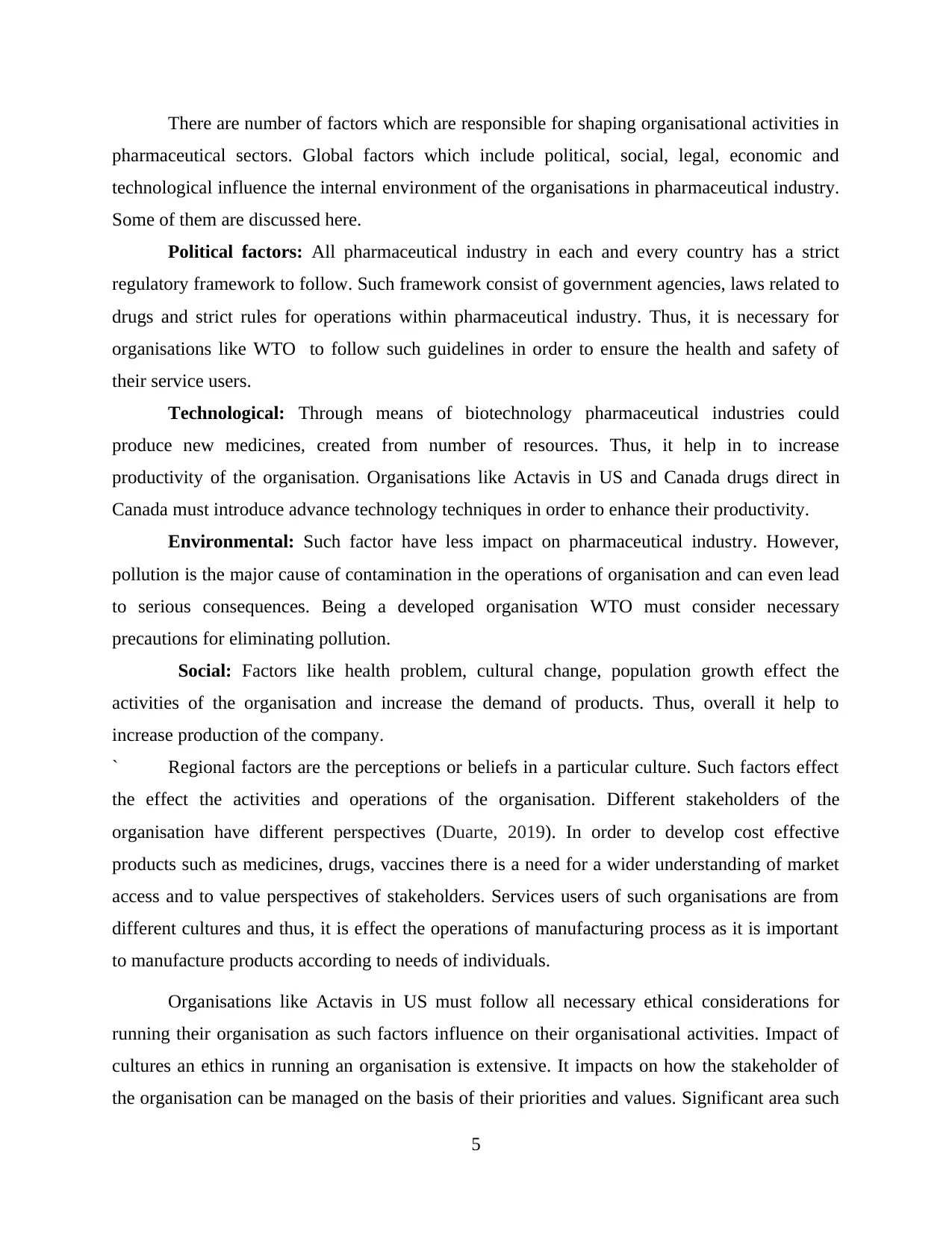
There are number of factors which are responsible for shaping organisational activities in
pharmaceutical sectors. Global factors which include political, social, legal, economic and
technological influence the internal environment of the organisations in pharmaceutical industry.
Some of them are discussed here.
Political factors: All pharmaceutical industry in each and every country has a strict
regulatory framework to follow. Such framework consist of government agencies, laws related to
drugs and strict rules for operations within pharmaceutical industry. Thus, it is necessary for
organisations like WTO to follow such guidelines in order to ensure the health and safety of
their service users.
Technological: Through means of biotechnology pharmaceutical industries could
produce new medicines, created from number of resources. Thus, it help in to increase
productivity of the organisation. Organisations like Actavis in US and Canada drugs direct in
Canada must introduce advance technology techniques in order to enhance their productivity.
Environmental: Such factor have less impact on pharmaceutical industry. However,
pollution is the major cause of contamination in the operations of organisation and can even lead
to serious consequences. Being a developed organisation WTO must consider necessary
precautions for eliminating pollution.
Social: Factors like health problem, cultural change, population growth effect the
activities of the organisation and increase the demand of products. Thus, overall it help to
increase production of the company.
` Regional factors are the perceptions or beliefs in a particular culture. Such factors effect
the effect the activities and operations of the organisation. Different stakeholders of the
organisation have different perspectives (Duarte, 2019). In order to develop cost effective
products such as medicines, drugs, vaccines there is a need for a wider understanding of market
access and to value perspectives of stakeholders. Services users of such organisations are from
different cultures and thus, it is effect the operations of manufacturing process as it is important
to manufacture products according to needs of individuals.
Organisations like Actavis in US must follow all necessary ethical considerations for
running their organisation as such factors influence on their organisational activities. Impact of
cultures an ethics in running an organisation is extensive. It impacts on how the stakeholder of
the organisation can be managed on the basis of their priorities and values. Significant area such
5
pharmaceutical sectors. Global factors which include political, social, legal, economic and
technological influence the internal environment of the organisations in pharmaceutical industry.
Some of them are discussed here.
Political factors: All pharmaceutical industry in each and every country has a strict
regulatory framework to follow. Such framework consist of government agencies, laws related to
drugs and strict rules for operations within pharmaceutical industry. Thus, it is necessary for
organisations like WTO to follow such guidelines in order to ensure the health and safety of
their service users.
Technological: Through means of biotechnology pharmaceutical industries could
produce new medicines, created from number of resources. Thus, it help in to increase
productivity of the organisation. Organisations like Actavis in US and Canada drugs direct in
Canada must introduce advance technology techniques in order to enhance their productivity.
Environmental: Such factor have less impact on pharmaceutical industry. However,
pollution is the major cause of contamination in the operations of organisation and can even lead
to serious consequences. Being a developed organisation WTO must consider necessary
precautions for eliminating pollution.
Social: Factors like health problem, cultural change, population growth effect the
activities of the organisation and increase the demand of products. Thus, overall it help to
increase production of the company.
` Regional factors are the perceptions or beliefs in a particular culture. Such factors effect
the effect the activities and operations of the organisation. Different stakeholders of the
organisation have different perspectives (Duarte, 2019). In order to develop cost effective
products such as medicines, drugs, vaccines there is a need for a wider understanding of market
access and to value perspectives of stakeholders. Services users of such organisations are from
different cultures and thus, it is effect the operations of manufacturing process as it is important
to manufacture products according to needs of individuals.
Organisations like Actavis in US must follow all necessary ethical considerations for
running their organisation as such factors influence on their organisational activities. Impact of
cultures an ethics in running an organisation is extensive. It impacts on how the stakeholder of
the organisation can be managed on the basis of their priorities and values. Significant area such
5
Paraphrase This Document
Need a fresh take? Get an instant paraphrase of this document with our AI Paraphraser
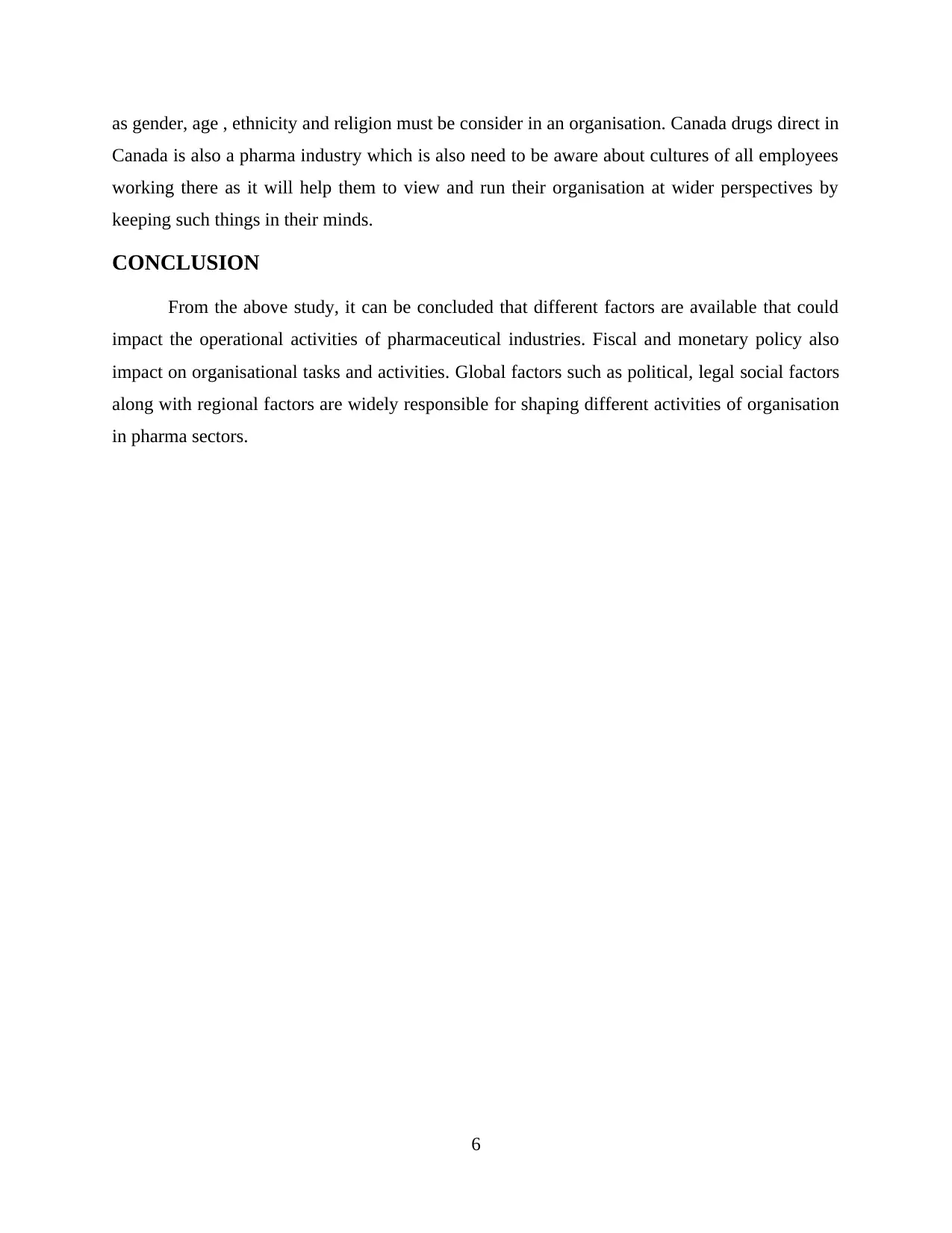
as gender, age , ethnicity and religion must be consider in an organisation. Canada drugs direct in
Canada is also a pharma industry which is also need to be aware about cultures of all employees
working there as it will help them to view and run their organisation at wider perspectives by
keeping such things in their minds.
CONCLUSION
From the above study, it can be concluded that different factors are available that could
impact the operational activities of pharmaceutical industries. Fiscal and monetary policy also
impact on organisational tasks and activities. Global factors such as political, legal social factors
along with regional factors are widely responsible for shaping different activities of organisation
in pharma sectors.
6
Canada is also a pharma industry which is also need to be aware about cultures of all employees
working there as it will help them to view and run their organisation at wider perspectives by
keeping such things in their minds.
CONCLUSION
From the above study, it can be concluded that different factors are available that could
impact the operational activities of pharmaceutical industries. Fiscal and monetary policy also
impact on organisational tasks and activities. Global factors such as political, legal social factors
along with regional factors are widely responsible for shaping different activities of organisation
in pharma sectors.
6
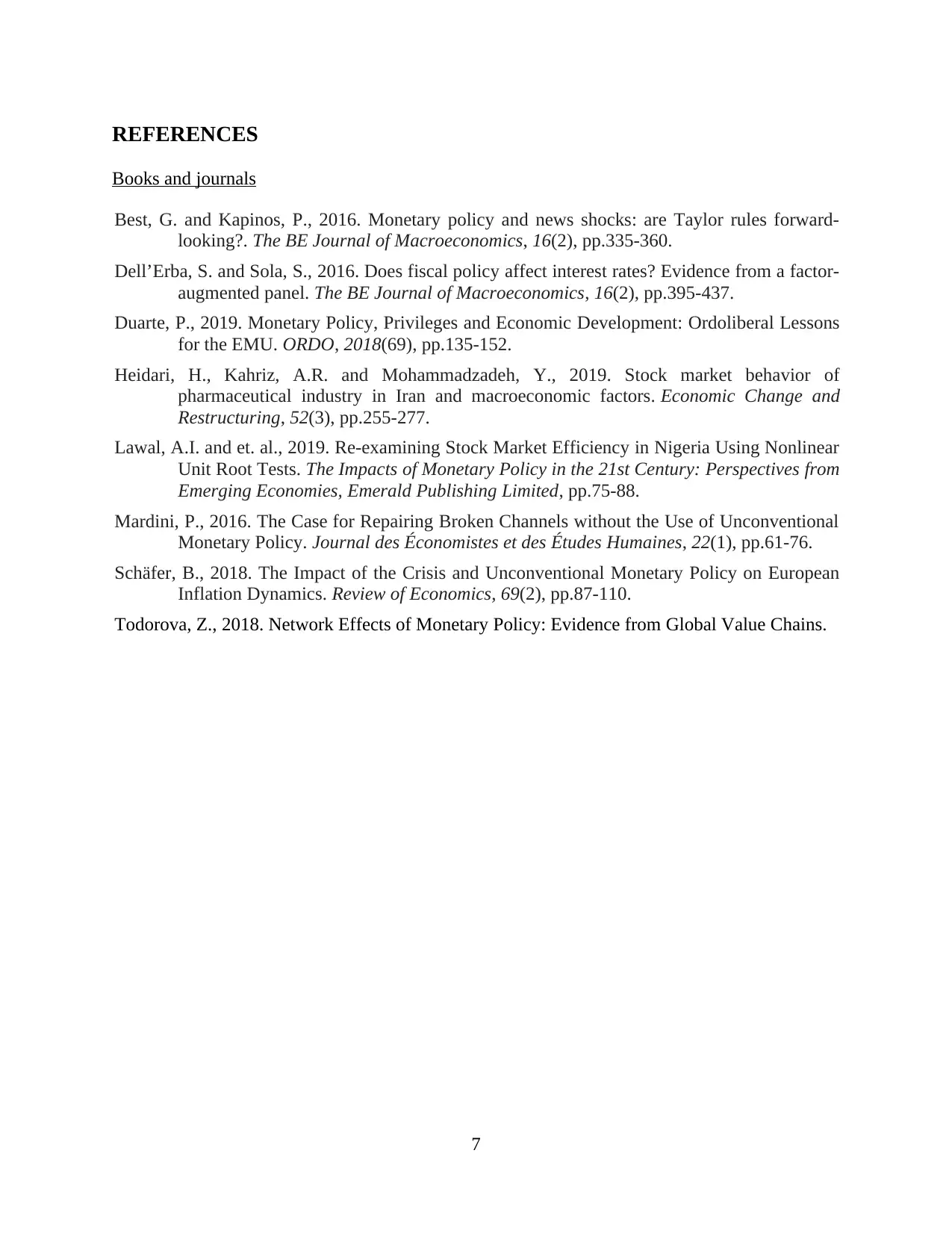
REFERENCES
Books and journals
Best, G. and Kapinos, P., 2016. Monetary policy and news shocks: are Taylor rules forward-
looking?. The BE Journal of Macroeconomics, 16(2), pp.335-360.
Dell’Erba, S. and Sola, S., 2016. Does fiscal policy affect interest rates? Evidence from a factor-
augmented panel. The BE Journal of Macroeconomics, 16(2), pp.395-437.
Duarte, P., 2019. Monetary Policy, Privileges and Economic Development: Ordoliberal Lessons
for the EMU. ORDO, 2018(69), pp.135-152.
Heidari, H., Kahriz, A.R. and Mohammadzadeh, Y., 2019. Stock market behavior of
pharmaceutical industry in Iran and macroeconomic factors. Economic Change and
Restructuring, 52(3), pp.255-277.
Lawal, A.I. and et. al., 2019. Re-examining Stock Market Efficiency in Nigeria Using Nonlinear
Unit Root Tests. The Impacts of Monetary Policy in the 21st Century: Perspectives from
Emerging Economies, Emerald Publishing Limited, pp.75-88.
Mardini, P., 2016. The Case for Repairing Broken Channels without the Use of Unconventional
Monetary Policy. Journal des Économistes et des Études Humaines, 22(1), pp.61-76.
Schäfer, B., 2018. The Impact of the Crisis and Unconventional Monetary Policy on European
Inflation Dynamics. Review of Economics, 69(2), pp.87-110.
Todorova, Z., 2018. Network Effects of Monetary Policy: Evidence from Global Value Chains.
7
Books and journals
Best, G. and Kapinos, P., 2016. Monetary policy and news shocks: are Taylor rules forward-
looking?. The BE Journal of Macroeconomics, 16(2), pp.335-360.
Dell’Erba, S. and Sola, S., 2016. Does fiscal policy affect interest rates? Evidence from a factor-
augmented panel. The BE Journal of Macroeconomics, 16(2), pp.395-437.
Duarte, P., 2019. Monetary Policy, Privileges and Economic Development: Ordoliberal Lessons
for the EMU. ORDO, 2018(69), pp.135-152.
Heidari, H., Kahriz, A.R. and Mohammadzadeh, Y., 2019. Stock market behavior of
pharmaceutical industry in Iran and macroeconomic factors. Economic Change and
Restructuring, 52(3), pp.255-277.
Lawal, A.I. and et. al., 2019. Re-examining Stock Market Efficiency in Nigeria Using Nonlinear
Unit Root Tests. The Impacts of Monetary Policy in the 21st Century: Perspectives from
Emerging Economies, Emerald Publishing Limited, pp.75-88.
Mardini, P., 2016. The Case for Repairing Broken Channels without the Use of Unconventional
Monetary Policy. Journal des Économistes et des Études Humaines, 22(1), pp.61-76.
Schäfer, B., 2018. The Impact of the Crisis and Unconventional Monetary Policy on European
Inflation Dynamics. Review of Economics, 69(2), pp.87-110.
Todorova, Z., 2018. Network Effects of Monetary Policy: Evidence from Global Value Chains.
7
⊘ This is a preview!⊘
Do you want full access?
Subscribe today to unlock all pages.

Trusted by 1+ million students worldwide
1 out of 9
Related Documents
Your All-in-One AI-Powered Toolkit for Academic Success.
+13062052269
info@desklib.com
Available 24*7 on WhatsApp / Email
![[object Object]](/_next/static/media/star-bottom.7253800d.svg)
Unlock your academic potential
Copyright © 2020–2026 A2Z Services. All Rights Reserved. Developed and managed by ZUCOL.





